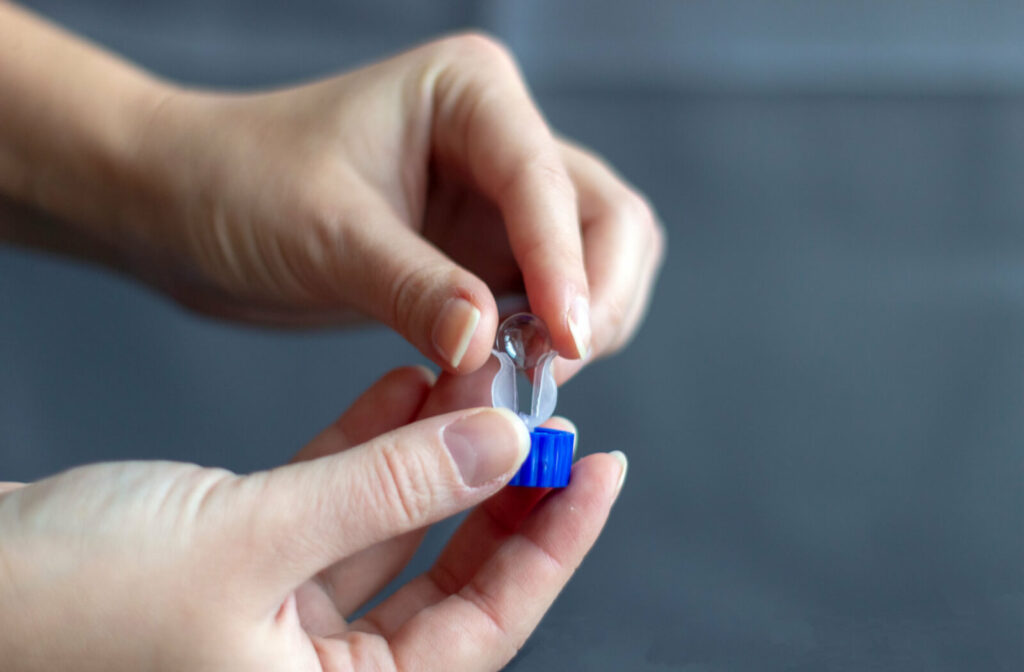Nearsightedness, or myopia, isn’t just a temporary issue. It’s a lifelong condition that can impact your child’s eye health and ability to see the world clearly. The good news is that there are plenty of ways to manage it. One common solution? Orthokeratology.
Orthokeratology, often referred to as ortho-k, is a type of myopia control that involves wearing specialty contact lenses overnight that temporarily reshape your cornea. Once you take the lenses out in the morning, you’ll have clear vision for the rest of the day.
How Does Ortho-K Work?
Myopia is caused by a problem with the shape of the eye. When the eye is shaped properly, light reaches the retina directly. But with myopia, the eye grows too long or the cornea is too curved, causing light to fall in front of the retina instead. This results in blurry vision for objects at a distance.
Ortho-k is a nonsurgical approach to treating this condition through specialty contact lenses. It can be used by adults and children alike to help give you clear vision! But it works a little differently than glasses or regular contacts.
Instead of wearing contact lenses during the day, these rigid, gas-permeable lenses are worn while you sleep and removed in the morning. While you’re sleeping, the lenses apply gentle pressure to the eye. They shouldn’t cause pain or significant discomfort, though it may take a couple of days to get used to the sensation.
When you remove the lenses in the morning, the physical shape of the front of the eye itself is changed. This helps light refract properly to reach your retina and gives you clear vision for the rest of the day. If you stop wearing the lenses, the shape of your eye will eventually revert back to its original shape.
Does Ortho-K Permanently Fix Vision?
Ortho-k doesn’t permanently fix vision. Your eyes are incredibly complex, and these lenses can’t permanently reshape the cornea. Instead, over the course of a day or 2, your eye is going to start slowly reverting to its natural shape.
If you stop wearing the lenses, whether for a night, a week, or forever, the cornea reverts to its original shape. Then, your vision problems will return until you resume treatment.
Why Is Ortho-K Recommended for Myopia Control?
Consistent ortho-k use doesn’t just provide clear vision throughout the day—it’s been shown to reduce myopia progression in school-age children by a significant margin, which can be beneficial for their lifelong eye health.
Myopia is common, but that doesn’t mean it’s harmless. If it’s left unaddressed, it can lead to problems with your long-term eye health. Remember, it’s a progressive condition, so it’ll continue developing as your child grows. In fact, in some situations, it can reach high myopia, which can have significant effects on a person’s life.
High myopia occurs when myopia progresses further than normal. The eye becomes significantly misshapen, and this can actually affect the overall health of your eye. It can lead to a large increase in the likelihood of developing:
- Glaucoma
- Cataracts
- Retinal detachment
- Macular degeneration
This is why myopia control is often recommended. With early intervention, myopia control can reduce how far your child’s myopia progresses and lower their risk of developing these conditions later in their life.

What Should I Expect from Ortho-K?
When your child first uses these lenses, they might feel a little odd. It’s not usually considered uncomfortable or painful, but there may be a minor amount of noticeable pressure. They’ll know they’re wearing them.
Then, they can go to sleep like normal. In the morning, they take the lenses out (and store them appropriately) and they will notice an immediate improvement in their vision. This will last all day, and they can put the lenses back in once they’re ready to go to sleep. After a while, it’ll be like second nature to them.
Is Ortho-K Safe?
Ortho-k has very few drawbacks other than the adjustment period. It can take a little bit of time to get used to the sensation, especially if they’ve never worn contacts before. But once they’re used to wearing the lenses, ortho-k can be an excellent long-term investment for preserving your child’s vision.
As long as you regularly clean the lenses as recommended and follow proper contact lens care, these lenses are safe to use. Don’t forget to:
- Clean the contacts before storing them
- Never use outdated cases or cleaning solution
- Wash your hands thoroughly with soap and water before and after handling the lenses
Ortho-k lenses are customized and specifically designed for your child’s unique eye shape. If they report any pain or noticeable irritation, have them take the lenses out and clean them. If the feeling is still there, consult with your optometrist.
Benefits of Ortho-K
While glasses and contacts are a great way to deal with vision problems, they sometimes do have drawbacks. They can be jostled, knocked loose, or broken during the day. For contacts, they may begin to feel irritating if worn for too long.
For children, ortho-k can be an excellent alternative full of benefits. Children can be extremely active! Whether they’re playing sports, running in gym class, or playing with their friends on the playground, it seems like children are always on the move.
This is where ortho-k shines. You and your child don’t have to worry about broken glasses or a lost contact lens. Instead, the lenses stay at home while your child goes about their day seeing their world clearly.
Learn More About Ortho-K
If you’re considering ortho-k for you or your child, come visit us at Fort Myers Eye Associates. We’re committed to helping you and your family see clearly. We’re here to help, so why wait? Book an appointment today to discuss ortho-k with our team!





